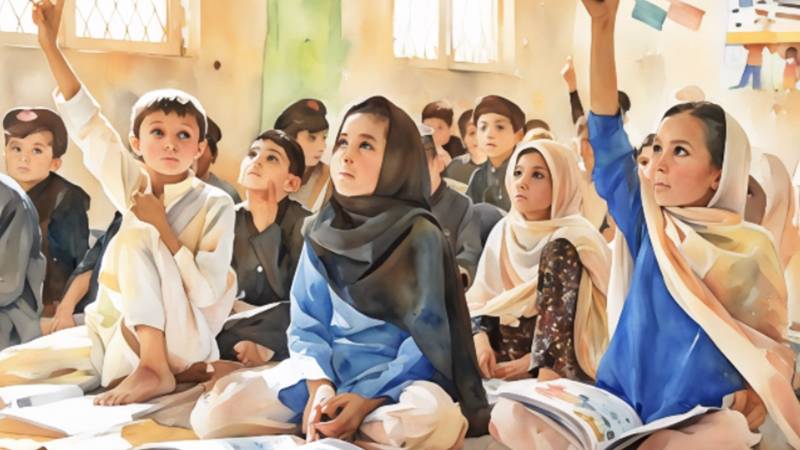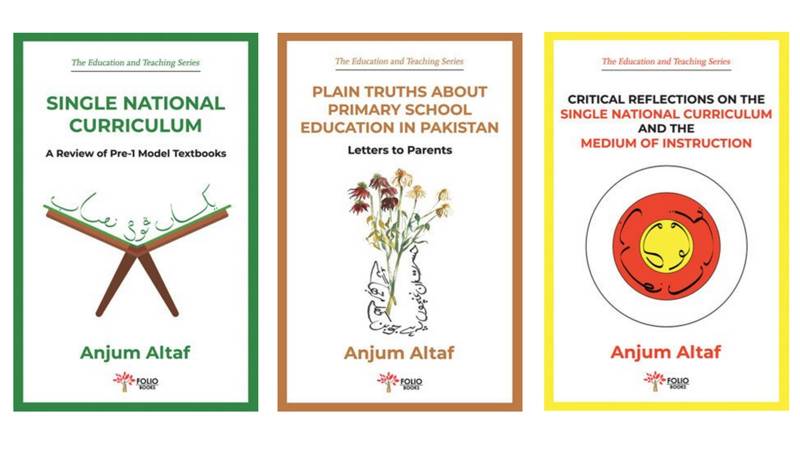
There’s a special kind of legacy that the written word leaves, and it shines brighter in a world that is increasingly reliant on quick information – only for it to become old in this digital era. Anjum Altaf’s body of work in the form of books are in a league of their own, in terms of their value and the service he has done to the Pakistani nation. However, the fate of his contribution is the same as that of the Greats: the appreciation that his work deserves will come in too late.
This belief is not so much rooted in cynicism as it is in reality. Let’s take a look at the obvious first: the SNC was first introduced by the PML-N as a means of setting a base curriculum to ensure all children had equal footing in basic literacy. Note, basic literacy, not necessarily knowledge which is where a real curriculum and proper rooting of a functioning education system could take place. The PTI, who had its own stance of creating a homogenous society based on Riyasat-e-Madinah, used education as a political tool for its own ideology, which was infused with a heavy dose of religion. Thus began the battle over the minds of children.
It is very apt, then, that Altaf’s book What We Get Wrong About Education In Pakistan opens with Bertrand Russell’s quote: “What is considered in education is hardly ever the boy or girl, the young man or young woman, but almost always, in some form, the maintenance of the existing order.”
Hence while examining why, after 75 years (in 2022), the Pakistani nation is still functionally illiterate, Altaf delivers a devastating truth that has left us crippled beyond repair: “spreading literacy amongst the illiterate has a very low priority for the literate managers of the country.” He goes on to note that the political-economic system – at least one form of it – is upheld where rulers are quite happy with the status quo and are not interested in educating constituents.
Knowing the public education system is broken and the private school system is exploitative is one thing, but the lack of realisation of the impact of both is where parents can be held accountable
Nevertheless, continuing with the timeline, the PTI came to power 2018 and the SNC was touted as an ace card. But then with a party promising change, one wonders why brick kiln schools were shut down under the PTI where 2,000 children – now most likely young adults – were deprived of education and remain illiterate today?
And who can forget the chhaapas made on schools, moral policing them on how girls were dressed and whether boys were wearing caps or what school activities regarding music were unacceptable or why schools were not teaching SNC curricula or how non-Muslim children were subjected to further ostracisation during lessons on religion in an environment that is already hostile to them? This is where the political agenda came in.
As Altaf writes, “while literacy is important, the content of that literacy is even more important.” Giving the case study of the late Dr Asghar Ali Engineer, who was asked as to why the educated middle class was more bigoted than the illiterate masses, he replied “because it is educated.” Altaf also uses other examples to show how other countries used education as a political tool - the Chinese with the Little Red Book, Russians with Marxism-Leninism and Cubans with the New Socialist Man.
One wonders, then, as to what the esteemed SNC committee was thinking when this book came out in 2022? Perhaps because the committee was made up of ghost names, one can forgive them for not reading Altaf’s books to figure out what really was wrong with the education system that they promised to fix, or rather utilise. Then again, as Altaf notes “education is not pouring propaganda into empty minds but enabling those minds to think for themselves.” Case closed.
Then we have Altaf’s book Critical Reflections On The Single National Curriculum And The Medium Of Instruction. Very apt that the book begins with Ghalib’s “Ya Ilaahi yih maajra kya hai.”
Every single Pakistani who can read the English language ought to have a copy of this book. Written in 2021, Anjum asks two most important questions which really convey the devastation of the SNC: “If this experiment fails, who is going to bear the costs and who will be held accountable? What will be the impact on children and will they be able to regain their lost years?”
Reading that had me putting this book down with a heavy heart because the answers really lie with civil society, who readily accepted the SNC and never questioned it save for the few who were hounded mercilessly for daring to demand answers - a democratic right, might I add. Recognising our nation’s need to uphold our culture and of course the Islamic principles that the country insists on being the alam-bardar of, Altaf demonstrates what was is wrong with the SNC by cautiously addressing the sensitive issue about the biology textbook: “Students will now have to be sensitised to the problem of overpopulation while being denied any knowledge of its causes or modalities of control. How will this be possible?”
A crucial element in this is how Altaf traces the destruction of education back to Zia-ul-Haq. Defenders of Zia and history revisionists who thump their chests and declare that the root of all of Pakistan’s problems lie with Bhutto and Pakistani liberals could do with sitting down and thinking how today they lend soft legitimacy to this destruction. As Altaf quotes in his book Plain Truths About Primary School Education In Pakistan, Letters To Parents, Sheikh Saadi wrote ‘When the first brick is laid crooked by the architect, The wall will remain crooked even if raised to the stars.”

Noting that “Zia was the most Islamic of our rulers and as well intentioned as anyone else. His curricular interventions are not deemed to have been good for education.” Altaf rightly observes that intentions are irrelevant in the end. They really do not matter, especially in the context of education where the process was non-transparent with a predetermined plan and created by a team of 400, consisting of politicians, bureaucrats, school owners, textbook printers and madrassah managers.
Are these the people who were charged with shaping the minds of millions of children?
In India, the New Education Policy in 2020 was being discussed for 18 months in public and the state received over a quarter of million inputs. If only, if only, education hadn’t been peddled as a means to win votes and become Special Assistant to PM to get photographed with British royals, right now we would have a generation of children who had better thinking skills. Most importantly, to create a Riyasat-e-Madinah, the government of the time ought to have lived up to Islamic ideals and really engaged in an open discussion to foster inclusivity. But then again, the second objective of the SNC is ensuring “Social Cohesion and National Integration” and as Altaf notes, passive obedience serves best. As they say in Punjabi, gal hi mukk gayee.
At this point, one wonders as to what the parents have to say. On one hand there is a need to acknowledge the appalling treatment to which parents have been subjected when it comes to education. If an electorate can be expected to vote for whoever they want as leaders, why can’t they be part of the system to decide what goes into their children’s heads? What are taxes for? And who can forget how parents protested against the fee hikes by private schools as a form of exploitation – only for owners to respond callously, and then, further, only to concede that the private school network has failed to present a counter narrative.
Nevertheless, Pakistani parents are a unique group in the sense that Altaf observes in Letters To Parents, that “not just the poorest of its young generation but also its most affluent wish to leave for place that offer a better and more secure future.” What is one to expect when it is clear that obedience is to be expected and any efforts made are dismissed due to poor governance by a state made of "mediocre, poorly educated persons who cannot make good and sensible decisions?”
Raising two critical questions about the gross reality of the learning gap for those enrolled in schools and those completely out of school as well as the lack of the state interest in education, Altaf has written these heartfelt letters, almost as a plea to parents to take a stand.
Here two concerns crop up. One, why are these letters only in English and not in regional languages? An act of service has to have a wider reach and while publishing is a struggle, these letters might galvanise the awareness needed amongst civil society that has been exhausted to the point where thinking is non-existent.
Secondly, in a country fragmented and broken to the point where the average household currently is in survival mode, what purpose will these letters serve? Yes, it is an act of planting seeds in parents minds but what are they expected to do with it? Although here one will argue that especially in urban areas, if one can see an outpour onto the streets for political rallies and jalsas, then why do we not see the same fervour in protesting against what the state has done to education? Priorities is what it comes down to and this is where Altaf’s letters might hit a sore nerve.
Knowing the public education system is broken and the private school system is exploitative is one thing, but the lack of realisation of the impact of both is where parents can be held accountable. Unity is a word taught but rarely practised. Hence, to expect civil society to show concern for public school strata is not asking too much and frankly, the lack of concern for those less privileged is the price paid in the shape of those governing the country. The other is vision. What do we as Pakistanis dream of? What are the long terms goals towards which parents are focused on when it comes to shaping their children’s futures?
There is a particular passage that sums it up when it comes to who will save the children of Pakistan:
“Whether a country is the self-styled leading liberal democracy in the world or the self-proclaimed leader of the Islamic ummah, neither shies away from literally using children as cannon fodder to achieve their grandiose but undemocratic and unethical political ends […] It is only parents who can make sure that their children are not being misused and abused in this manner.”

